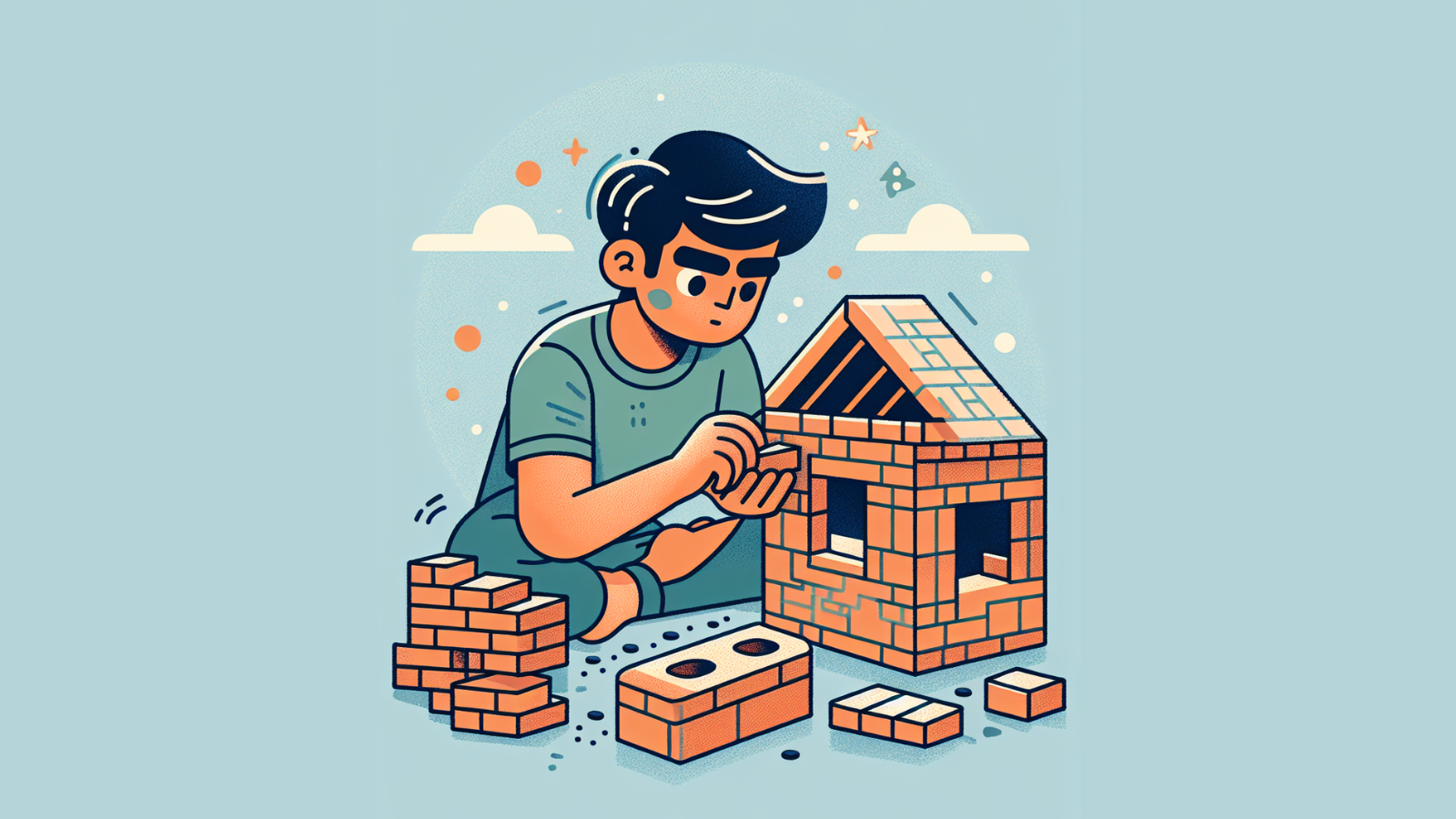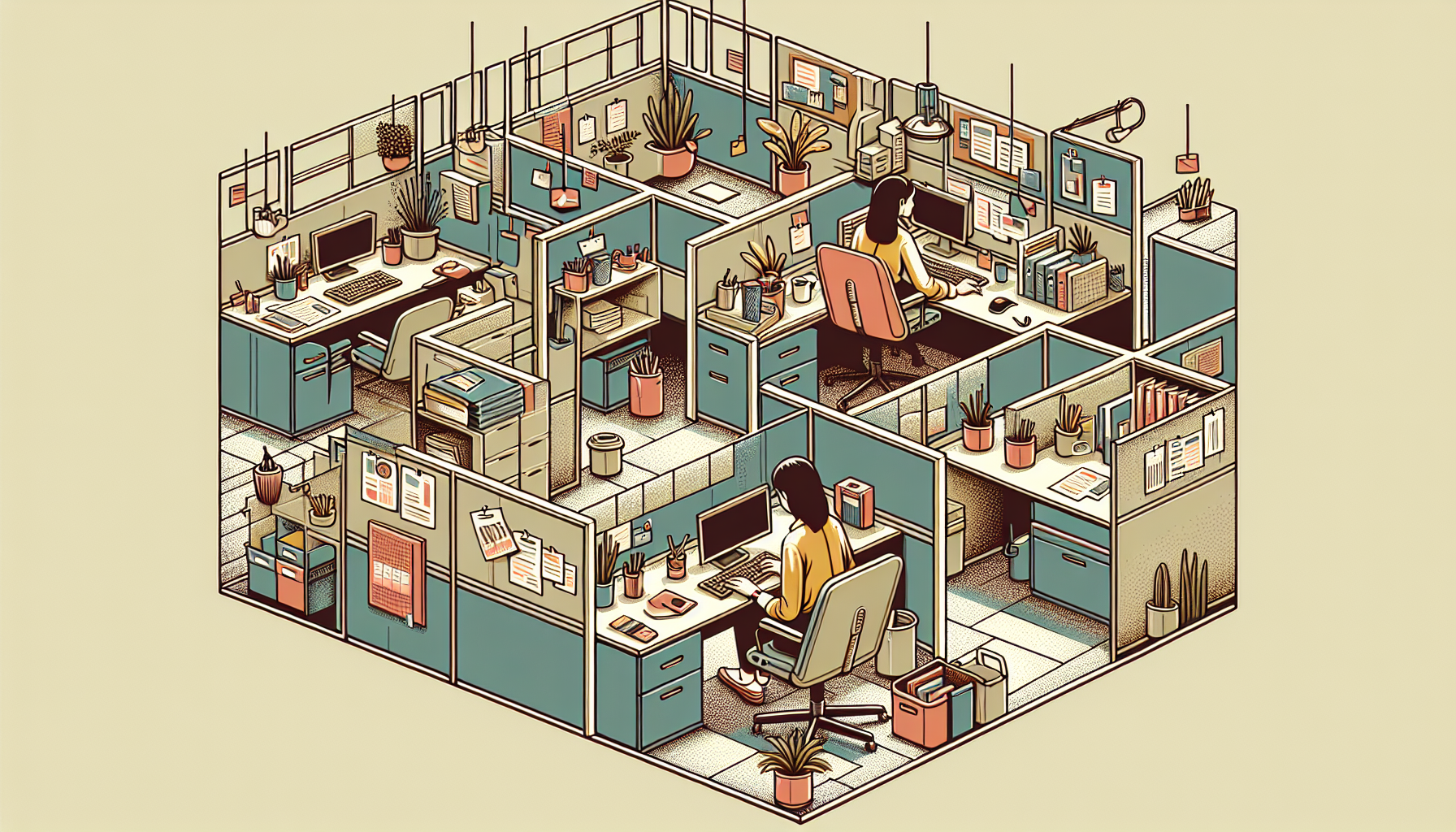"I prefer the freedom of freelancing."
—freelancer who's never taken a week off
"I prefer the stability of a job."
—employee who's about to get laid off
When you're a full-time employee, you live in a rented house. You're given a floor (salary), walls (structure), and ceiling (hierarchy).
If you don’t like it, you can move.
When you're a freelancer, you build the house yourself. Brick by brick, you lay the foundations of how you make money, construct your own systems, make your own schedule, set your own pace, and own every consequence.
If it ever feels too small, you can always knock down a wall. But there's no landlord to complain to when the roof starts leaking or it gets chilly at night.

We attribute full-time employment with a sense of security that has just as much in common with dependancy when employers can use it against you or take it away at any time.
And we credit freelancing with flexibility—a positive spin on the burden of accountability that comes with total agency.
I've worked both in-house and as a freelancer throughout my career. I've even worked with a few companies as both a client and an employer. And the truth is, no matter where you stand, it's only human to covet what's on the other side of the fence.
Life as a full-time employee vs. freelancer
Between these two paths, no one can tell you what's best for you, especially if you're a writer, developer, designer, accountant, or in any remote-friendly career where in-house and freelance options are available to you.
When you end up working from home either way, the pros and cons of self-employment versus full-time employment become deeply personal as many of the differences (like a daily commute) start to disappear.
In case it helps anyone decide what's best for them, here's my take on the differences between life as a freelancer and an employee, and the stuff that more or less stays the same.
| As an Employee… | As a Freelancer… |
|---|---|
| 💰💸 Money | |
| You know exactly when your next paycheque will land. | There’s a lag—sometimes hours, sometimes months—between when you send an invoice and when you get paid. |
| Whatever money hits your bank account is yours to keep. | Whatever money hits your bank account is yours to keep (after setting some aside for taxes, operating expenses, etc.). |
| You don't think about taxes 'til tax season rolls around. | You think about taxes constantly. |
| 📆🕰️ Time | |
| Your calendar has more meetings than deadlines. | Your calendar has more deadlines than meetings. |
| You work synchronously (or at least move your mouse once in a while to show your boss you're online). | You work asynchronously, but have to be responsive to clients during their working hours. |
| You always know when it’s the Sunday before the Monday of a new work week. | You’ll forget what day of the week it is because sometimes your Sundays are Thursdays and your Mondays are Saturdays. |
| 👩💼👨💼 Interactions | |
| You have to juggle multiple stakeholders. | You have to juggle multiple clients. |
| You collaborate with your coworkers daily and get to know them over time. | You usually work alone, and your working relationships are more transient. |
| When people ask, "So what do you do?" you can just say your job title or employer. | When people ask, "So what do you do?" you need a good answer. Because "I'm a freelancer" can sound like "I'm a freeloader". |
| 💪🚀 Growth | |
| If you’re efficient, you're rewarded with more work. | If you’re efficient, you’re rewarded with a better ROI for your time. |
| It can take years before you see a promotion or get a raise. | It can take years to find the right balance between time spent, money earned, and work you like. |
| When you start to stagnate, you move on to a new and (hopefully) better job. | When you start to stagnate, you let go of low-value clients or services to make space for better ones. |
| 📈📉 Stability | |
| You commit around 40 hours per week most weeks (whether you actually work more or less can vary). | You flip-flop between being over-employed and fun-employed. |
| You can lose your job at any time and be forced to find another. | You can lose your clients at any time, or have them reduce your workload. But you'll "hopefully" have other clients to fall back on. |
| Your "pricing model" is an annual subscription to ~25% of your time and all of your skills (i.e. a salary). | Your pricing model can be a combination of project-based, hourly, retainer, per-word, commission, etc. It's up to you for each client. |
| 🛠️🛖 Structure | |
| You get health insurance and other benefits as part of your compensation package. | You pay out of your own pocket for any perks or settle down with an employee with decent benefits (kidding, in case my partner reads this). |
| You might get "Sunday Scaries" the night before the Monday of a new work week. | You might get "Surprise Scaries" at any day of the week about whether you'll ever find work again. |
| You’re given a predefined structure, including working hours, roles, responsibilities, and tools. | You set up your own systems, tools, and processes to handle all the admin, like proposals, contracts, bookkeeping, and invoices. |
You're an employee—should you go freelance?

Do you enjoy working?
If you don't like the work you do (writing, marketing, design, coding) and jump right into freelancing, you're going to find yourself unemployed, not self-employed.
Likewise, if you're frustrated by the stuff at work that gets in the way of doing the work, like pointless meetings and office politics, then freelancing might be for you.
As a freelancer, there's no quiet quitting, team building, compliance training, or logging into Slack before checking out for the day. The tradeoff: You're not just just showing up to get paid; you're working to be retained.
It's easier to recommend freelancing to people who value how they make money over how much.
If making money is your only motive, chances are a chill corporate job with freelance gigs on the side will get you there faster than freelancing full-time. That's not to say you can't earn more from freelancing, but you need to set revenue goals and stick to them.
Self-employment also doesn't mean you can say goodbye to hierarchies, having a boss, and doing things you don't like.
My dad, a mechanic who's been self-employed for 40+ years, put it best:
When you own a business, you're not the boss. You're an employee.
Are you willing to get better at cash flow management?
There's no floor or ceiling on what you can make as a freelancer. That's as exciting as it is scary when you're starting out. The thing is: New freelancers tend to focus on the newfound skies over head and forget the missing floor under their feet.
At the peak of my career as an employee, I could expect $7k in net income to hit my bank account on the same day every month—like clockwork.
I could also expect to spend 50 to 60 hours most weeks for it.
At the peak of my career as a freelancer, I had about $14k in gross income hit my bank account one month. Then only $5k the following month because I'd been paid upfront for some work the month prior (hence the $14k). After setting some aside for taxes and operating expenses, I pocketed less than $7k per month during that two-month period.
The unpredictable lag between when I sent an invoice and when I actually got the money meant I got paid like clockwork—in a Salvador Dalí painting.

But it also meant my hours were truly mine to trade, and I could experiment freely to find my own balance between time and money.
Can you stay organized?
You might have a high tolerance for chaos personally, but your business and your clients don't.
You either get organized or you get swamped. From bookkeeping to client management, you have to be on top of it all even if you eventually outsource or automate parts of your process.
If it makes you feel better, I was never a very organized person, but running a business made me one.
Can you handle rejection?
Freelancing forces you to develop thick skin and a high tolerance for failure. You need to be someone who isn't afraid to shoot their shot and knock on doors (i.e. send a cold email), and who doesn't stay down for long when they trip and fall.
It took me around 6 months to figure out my systems and operating model. But it wasn't until after I'd experienced my first tax season, first bad client, first ghosted proposal, among other humbling firsts, that I felt like I'd finished onboarding as a full-time freelancer.
Are you and your skills in high demand?
If recruiters and hiring managers hit up your inbox regularly, there's a good chance you could earn more for your time by channeling that demand as a freelancer.
It's especially worth betting on yourself if you're someone who:
- Doesn't want to manage people
- Feels like you've hit a ceiling as an individual contributor
- Has a valuable network you can tap for potential clients
- Is confident in your craft
Do you have enough runway for the ramp up and the rainy days?
Nothing undermines your standing in any negotiation like desperation. If you say yes to every offer that comes your way, you'll get buried fast.
Raising your rates means choosing no deal before you choose a bad deal—putting yourself in a position where you can say no to work that doesn't pay well or offer value you can leverage (e.g. filling a gap in your portfolio or adding an impressive logo to your list of clients).
And that means having a plan B for dry spells in the form of career security. For me, it was having ~8 months of living expenses saved up, a varied portfolio, and a network I can rely on.
Unfortunately, biting off more than you can chew is a rite of passage for every freelancer—something you learn in retrospect, not from reading some blog post on the internet.
Does a blank slate excite you or scare you?

If you're not excited by the prospect of a blank slate you can fill in however you want, the biggest benefit of self-employment will feel like a burden.
You have to be okay with starting to fill in plans without knowing what the final version looks like—not just where you want your business to be in a year, but how you're going to spend today.
Spoiler alert: The picture you end up with isn't going to be the one you had in your head when you started.
You're a freelancer—should you accept that job offer?

Are you working 40+ hours per week anyway?
It's incredibly common when you're self-employed to build a profitable business you want to burn to the ground and start over again—when you set up the wrong systems, hire the wrong people, or build the wrong client base.
At the very least, taking a job at a company for a chapter or two in your career isn't a bad way to reset and reevaluate your freelance business before jumping back in.
Do you want to level up your skills?
There's a lot you learn as a freelancer that you just don't learn as an employee, like how to run your own business.
But there's also a lot you learn as an employee that you won't learn as a freelancer, like:
- The inner workings of a growing business
- How to collaborate as part of a multi-disciplinary team
- The different ways your work can impact a company
- Navigating corporate politics and hierarchies
- The going rates for what a company is willing to pay (hiring freelance writers helped me set my own rates)
- The expensive lessons you can only learn while failing on someone else's dime
Would employee benefits make your life a lot easier?
Flexible remote work, whether freelance or in-house, can be life-changing for parents, caregivers, or people with limited mobility.
Where a full-time remote job comes out ahead is if having health insurance, steady income, paid time-off, and sick days as part of a figured-out-for-you package would take a load off your shoulders.
It's still possible to have these perks as a freelancer, but you have to build them into your business yourself.
Can your employer offer you a better operating system?
When you join a company, you inherit an operating system that includes technology, resources, rituals, and rewards.
There are many ways that can be a good thing—if you're not the most organized person, or if your employer can give you access to tools and resources you wouldn't be able to afford otherwise.
There are also ways structure can be a bad thing—if those systems end up holding you back, wasting your time, wearing you down, or limiting your growth.
Can you learn from your manager?
Clients often hire you to make up for the expertise they lack. You might learn a new trick here and there from a client, but a good manager is like having a coach in your corner.
If you get a job offer that lets you work with a manager who can help you level up, you can keep what you learn from them even if you go back to freelancing after.
Or something in between...
In a hyper-competitive job market with AI and offshoring claiming jobs from both camps, it's harder than ever to say what's "better" or even "safer" between freelancing and full-time employment.
What I do know is that it's no longer a crossroads with only two paths:
- Companies of all sizes are hiring part-time and full-time contractors from around the world to fill specialized roles with less overhead.
- Recently laid-off employees are taking career breaks, freelancing while they figure out what's next.
- Former lifers are hopping off the corporate ladder to spread their wings and find out if they can fly.
- Experienced freelancers are accepting job offers and taking contract work on the side.
Life is short, careers are long. And the right choice is allowed to change with each new chapter in your story.
